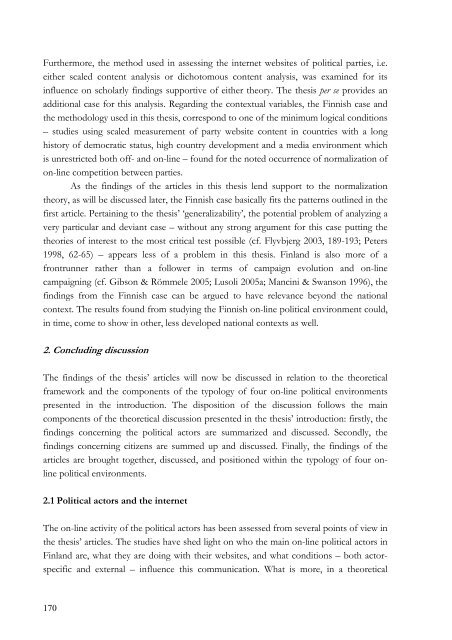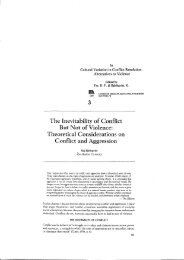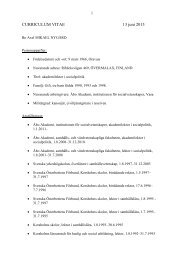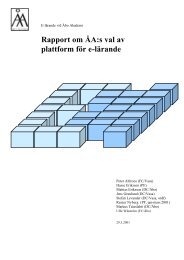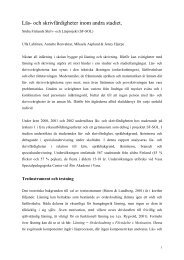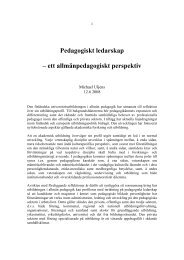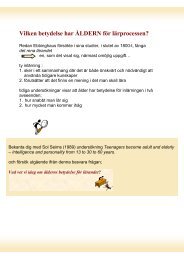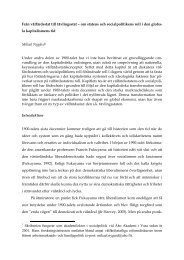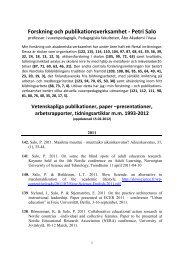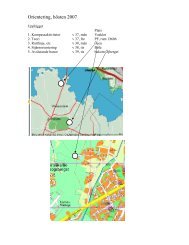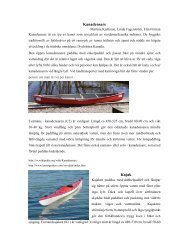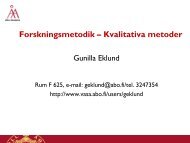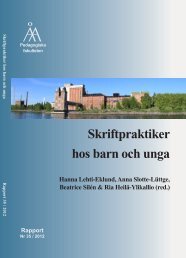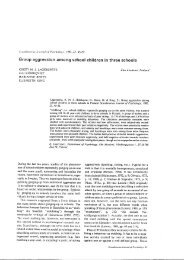Parties, Candidates and Citizens On-Line - Åbo Akademi
Parties, Candidates and Citizens On-Line - Åbo Akademi
Parties, Candidates and Citizens On-Line - Åbo Akademi
Create successful ePaper yourself
Turn your PDF publications into a flip-book with our unique Google optimized e-Paper software.
Furthermore, the method used in assessing the internet websites of political parties, i.e.<br />
either scaled content analysis or dichotomous content analysis, was examined for its<br />
influence on scholarly findings supportive of either theory. The thesis per se provides an<br />
additional case for this analysis. Regarding the contextual variables, the Finnish case <strong>and</strong><br />
the methodology used in this thesis, correspond to one of the minimum logical conditions<br />
– studies using scaled measurement of party website content in countries with a long<br />
history of democratic status, high country development <strong>and</strong> a media environment which<br />
is unrestricted both off- <strong>and</strong> on-line – found for the noted occurrence of normalization of<br />
on-line competition between parties.<br />
As the findings of the articles in this thesis lend support to the normalization<br />
theory, as will be discussed later, the Finnish case basically fits the patterns outlined in the<br />
first article. Pertaining to the thesis’ ‘generalizability’, the potential problem of analyzing a<br />
very particular <strong>and</strong> deviant case – without any strong argument for this case putting the<br />
theories of interest to the most critical test possible (cf. Flyvbjerg 2003, 189-193; Peters<br />
1998, 62-65) – appears less of a problem in this thesis. Finl<strong>and</strong> is also more of a<br />
frontrunner rather than a follower in terms of campaign evolution <strong>and</strong> on-line<br />
campaigning (cf. Gibson & Römmele 2005; Lusoli 2005a; Mancini & Swanson 1996), the<br />
findings from the Finnish case can be argued to have relevance beyond the national<br />
context. The results found from studying the Finnish on-line political environment could,<br />
in time, come to show in other, less developed national contexts as well.<br />
2. Concluding discussion<br />
The findings of the thesis’ articles will now be discussed in relation to the theoretical<br />
framework <strong>and</strong> the components of the typology of four on-line political environments<br />
presented in the introduction. The disposition of the discussion follows the main<br />
components of the theoretical discussion presented in the thesis’ introduction: firstly, the<br />
findings concerning the political actors are summarized <strong>and</strong> discussed. Secondly, the<br />
findings concerning citizens are summed up <strong>and</strong> discussed. Finally, the findings of the<br />
articles are brought together, discussed, <strong>and</strong> positioned within the typology of four online<br />
political environments.<br />
2.1 Political actors <strong>and</strong> the internet<br />
The on-line activity of the political actors has been assessed from several points of view in<br />
the thesis’ articles. The studies have shed light on who the main on-line political actors in<br />
Finl<strong>and</strong> are, what they are doing with their websites, <strong>and</strong> what conditions – both actorspecific<br />
<strong>and</strong> external – influence this communication. What is more, in a theoretical<br />
170


